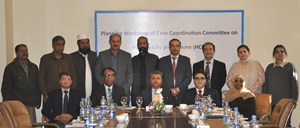 A healthy city is one that is continually creating and improving those physical and social environments and expanding those community resources which enable people to mutually support each other in performing all the functions of life and developing to their maximum potential13 November 2017 – The healthy city programme in Islamabad took a step forward last week under the leadership of His Excellency the Mayor of Islamabad and Chairman of the Capital Development Authority Mr Sheikh Ansar Aziz. The initiative was launched in October as a result of collaboration between WHO country office in Pakistan and the Health Directorate of Islamabad and the Capital Development Authority.
A healthy city is one that is continually creating and improving those physical and social environments and expanding those community resources which enable people to mutually support each other in performing all the functions of life and developing to their maximum potential13 November 2017 – The healthy city programme in Islamabad took a step forward last week under the leadership of His Excellency the Mayor of Islamabad and Chairman of the Capital Development Authority Mr Sheikh Ansar Aziz. The initiative was launched in October as a result of collaboration between WHO country office in Pakistan and the Health Directorate of Islamabad and the Capital Development Authority.
Islamabad will be the first model healthy city in Pakistan. A planning meeting was held on 9 November 2017 in Islamabad to discuss the planning and implementation phase of the programme. The key objectives of the planning meeting were to deliberate on the programme’s action plan, and to agree upon the core health and equity indicators for commissioning the Islamabad city health and socioeconomic development profile, which will be used as the evidence base of the programme. The meeting was inaugurated and chaired by Mr Ansar Aziz.
“The healthy city programme approach, focusing on urban health, involves comprehensive and systematic efforts to address inequalities, targeting needs of vulnerable groups like people from low-income areas and under-privileged segments of the society. This important initiative will play a pivotal role in the formation of a political, professional and technical alliance to achieve health improvement goals for Islamabad as well as creating a supportive environment in which innovative action for local development can take place, following a holistic and integrated approach. This is the best example of partnership between public, private and civil society and is the only systematic, sustainable way to comprehensively promote health and reduce inequalities in urban settings,” said Mr Ansar Aziz.
“I truly appreciate the unconditional and continuous support extended by His Excellency to initiate the Healthy City Programme in the beautiful city of Islamabad. I believe that mayors are well positioned to lead the Healthy City initiative due not only to their ability to bring together the many sectors in society, but also their skills in community organization and mobilization. I am confident that under the leadership of His Excellency the Mayor of Islamabad, the beautiful capital of Pakistan can become a model city not only for Pakistan but also for the region,” said Dr Mohammad Assai, WHO Representative in Pakistan.
“Lack of coordination among the various sectors in developing countries and overlooking vulnerable populations were the major causes of the failure of the Millennium Development Goals. The challenges of urban settings can be addressed through the healthy city programme, which is based on a multisectoral and integrated city management approach,” said Dr Hasan Orooj, Director of General Health Services, Capital Development Authority, and focal person for the healthy city programme.
The meeting concluded with an agreement on core health and equity indicators, the selection of target areas in the urban slums of Islamabad, and the responsibilities of a number of sectors and departments regarding the commissioning of the Islamabad city health and socioeconomic development profile as a next step. A working committee comprising representatives from WHO and a number of authorities, including health, planning, municipal administration, sanitation, and education under the Capital Development Authority umbrella was also formed to finalize the programme’s methodology.








